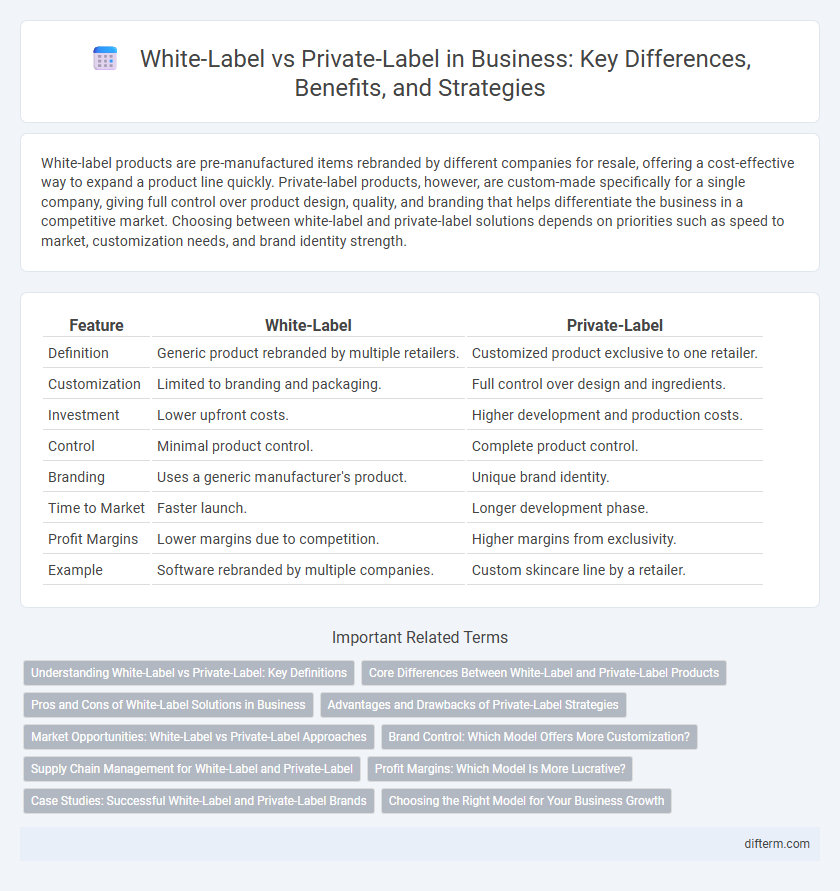White-label products are pre-manufactured items rebranded by different companies for resale, offering a cost-effective way to expand a product line quickly. Private-label products, however, are custom-made specifically for a single company, giving full control over product design, quality, and branding that helps differentiate the business in a competitive market. Choosing between white-label and private-label solutions depends on priorities such as speed to market, customization needs, and brand identity strength.
Table of Comparison
| Feature | White-Label | Private-Label |
|---|---|---|
| Definition | Generic product rebranded by multiple retailers. | Customized product exclusive to one retailer. |
| Customization | Limited to branding and packaging. | Full control over design and ingredients. |
| Investment | Lower upfront costs. | Higher development and production costs. |
| Control | Minimal product control. | Complete product control. |
| Branding | Uses a generic manufacturer's product. | Unique brand identity. |
| Time to Market | Faster launch. | Longer development phase. |
| Profit Margins | Lower margins due to competition. | Higher margins from exclusivity. |
| Example | Software rebranded by multiple companies. | Custom skincare line by a retailer. |
Understanding White-Label vs Private-Label: Key Definitions
White-label products are developed by one company and rebranded by others for resale, enabling businesses to offer ready-made solutions without investing in product development. Private-label products, on the other hand, are manufactured specifically for a retailer or company, allowing greater customization and exclusivity under the retailer's brand. Understanding the distinction between white-label and private-label strategies is crucial for businesses aiming to optimize branding, control, and market positioning.
Core Differences Between White-Label and Private-Label Products
White-label products are generic items produced by one company and rebranded by multiple retailers, allowing for broad distribution without customization. Private-label products are specifically manufactured for a single retailer, enabling tailored branding, packaging, and sometimes formulation to differentiate from competitors. The core difference lies in exclusivity and customization, with private-label offering greater control and brand identity compared to the standardized nature of white-label goods.
Pros and Cons of White-Label Solutions in Business
White-label solutions offer businesses rapid market entry and cost efficiency by utilizing pre-built products that can be rebranded, reducing development time and expenses. However, they present limitations in customization and differentiation, potentially leading to brand dilution and increased competition among companies offering identical products. Companies must weigh the ease of implementation against the risk of lower control over product features and customer experience when choosing white-label options.
Advantages and Drawbacks of Private-Label Strategies
Private-label strategies offer businesses greater control over product quality, branding, and pricing, enabling differentiation in competitive markets and higher profit margins. However, these strategies require significant investment in product development, marketing, and supply chain management, which can strain resources and increase operational complexities. Risk of brand dilution and challenges in building customer trust also pose potential drawbacks for companies adopting private-label approaches.
Market Opportunities: White-Label vs Private-Label Approaches
White-label products enable businesses to quickly enter markets by rebranding pre-made goods, reducing time-to-market and capital investment. Private-label approaches offer greater control over product customization and brand differentiation, fostering stronger customer loyalty and higher profit margins. Market opportunities for white-label focus on scalability and rapid expansion, while private-label strategies prioritize unique value propositions and long-term brand equity growth.
Brand Control: Which Model Offers More Customization?
Private-label models offer businesses greater customization and brand control by allowing companies to modify product design, packaging, and formulations to align closely with their brand identity. White-label products, while faster to market, provide limited customization, often restricting branding to logos and packaging only. Companies seeking full control over product features and brand messaging typically prefer private-label partnerships to enhance differentiation and customer loyalty.
Supply Chain Management for White-Label and Private-Label
White-label supply chain management emphasizes scalability and standardization, allowing multiple retailers to market identical products under their own brands with consistent quality control. Private-label supply chains require greater customization and flexibility to meet specific retailer specifications, often involving closer collaboration with manufacturers for unique product development. Efficient logistics and inventory management are critical in both models to ensure timely delivery and maintain brand reputation.
Profit Margins: Which Model Is More Lucrative?
White-label products generally offer higher profit margins due to lower initial development costs and faster time-to-market, allowing businesses to capitalize on established manufacturing efficiency. Private-label products require more investment in product design, branding, and quality control but can command premium pricing and stronger customer loyalty, often resulting in greater long-term profitability. Evaluating the balance between upfront expenses and pricing power is essential to determine the most lucrative model for a specific business strategy.
Case Studies: Successful White-Label and Private-Label Brands
Successful white-label brands like AmazonBasics leverage established retail platforms to offer a wide range of products under their own brand, ensuring rapid market entry and consumer trust. Private-label success stories such as Trader Joe's demonstrate how exclusive product sourcing and unique brand identity drive customer loyalty and high profit margins. Case studies reveal white-label's scalability benefits compared to private-label's stronger brand differentiation and control over product development.
Choosing the Right Model for Your Business Growth
White-label products offer scalable solutions by allowing businesses to rebrand existing goods with minimal customization, accelerating time-to-market and reducing development costs. Private-label products provide greater control over branding and product specifications, enabling differentiation and stronger customer loyalty through unique offerings. Selecting the right model depends on your growth strategy, budget constraints, target market preferences, and long-term brand positioning goals.
white-label vs private-label Infographic

 difterm.com
difterm.com